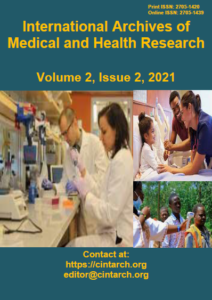
International Archives of Medical and Health Research (IAMHR), pISSN: 2705-1420; eISSN: 2705-1439
October to December 2021 Vol 2(2): pp.10-18 DOI: https://doi.org/10.33515/iamhr/2021.013/05
Copyright © 2021 C-International Archives
Original Article
Knowledge and practice of basic obstetric and newborn care among health workers in primary health facilities in Sokoto State, Nigeria
Inoh EE1*, Oche MO2, Awosan KJ2, Ezenwoko AZ1, Attahiru A1, Inoh MI3
1Department of Community Medicine, Usmanu Danfodiyo University Teaching Hospital, Sokoto, Nigeria
2Department of Community Health, Usmanu Danfodiyo University, Sokoto, Nigeria
3Department of ENT, University of Uyo Teaching Hospital, Uyo, Nigeria
*Corresponding Author’s Email: lizyinoh@gmail.com
Published December 30, 2021
ABSTRACT
Background: The World Health Organization states that about 15% of anticipated births worldwide will result in life-threatening complications during pregnancy, delivery, or postpartum. Because of the erratic nature of childbirth, emergency obstetric care has been called the bedrock in the arch of safe motherhood. Health workers are expected to possess good knowledge and appropriate practices to offer the signal functions that are the interventions for treating major causes of maternal complications and resuscitation of the newborn after delivery. Aim: This study aimed to determine the knowledge and practice of basic emergency obstetric and newborn care (BEmONC) among health workers in primary health facilities in Sokoto State, Nigeria. Methods: A cross-sectional study was conducted among 216 randomly selected health workers in the primary health facilities in Sokoto State, Nigeria. A structured self-administered questionnaire was used to collect data on the research variables. Data were analyzed using the IBM SPSS version 25 statistical computer software package. Results: Less than half of respondents had good knowledge (46.3%) and adequate practice (49.3%) of BEmONC with cadre being the sole predictor. Unskilled health workers were 99.2% less likely to have good knowledge of EmONC (aOR: 0.008; 95% CI: 0.002 – 0.027; p < 0.001) and 78.0% less likely to have adequate practice of EmONC (aOR: 0.022; 95% CI: 0.008 – 0.057; p < 0.001) as compared to the skilled health workers. Conclusion: This study showed that less than half of the respondents had good knowledge and adequate practice of basic EmONC with cadre being the sole predictor. The Sokoto State Primary Health Care Development Agency in conjunction with the Sokoto State Ministry of Health should provide a sufficient number of skilled health workers for the primary health facilities in the state in addition to organizing periodic on-the-job training for them.
Keywords: Knowledge, practice, basic EmONC, health workers, primary health facilities

